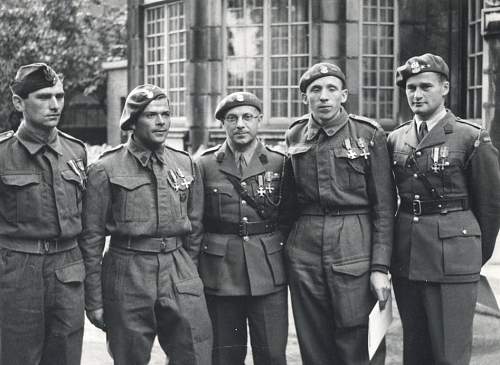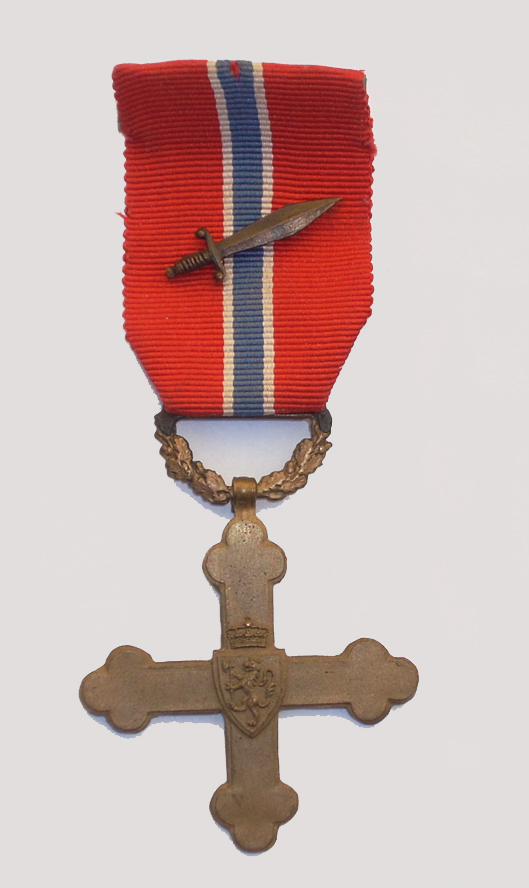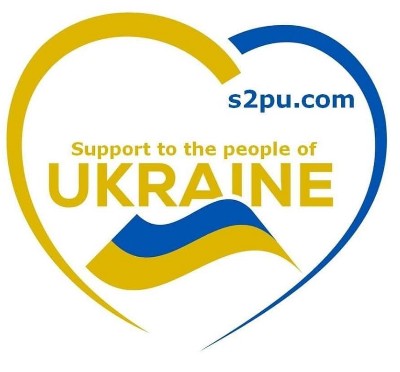 Wasyl Cykwa's later William Campbell (born 7th May 1914, died 30th June 2004 in Glasgow) was a Polish-Ukrainian soldier during World War II. He distinguished himself in the battle of Narvik and was awarded the Norwegian War Cross with swords for his efforts.
Wasyl Cykwa's later William Campbell (born 7th May 1914, died 30th June 2004 in Glasgow) was a Polish-Ukrainian soldier during World War II. He distinguished himself in the battle of Narvik and was awarded the Norwegian War Cross with swords for his efforts.
Wasyl Cykwa 2 from left
Cykwas was born of Ukrainian parents in a village southwest of Lviv called Rudki. His mother tongue was Ukrainian as were almost all of the inhabitants in that area. He only became a Polish citizen when that territory was given to Poland after WW1, just as it had been acquired by the Hapsburgs in earlier times. This area is now back to being Ukrainian.
The area was then part of the Habsburg Empire and fell to Poland after it disintegrated. In 1937 he applied to France to find work. When World War II broke out with the German and Soviet occupation of Poland in September 1939, he enlisted in the service of the Polish government, which was in exile in Angers, France. He received military training in Coëtquidan, Brittany, and was transferred to the Independent Podhale Brigade.
After the German attack on Norway on April 9, 1940, it was decided to send Cykwas' branch north, as part of the Allied attempt to resist the invasion. The unit, like that of the French-Polish expeditionary force, was shipped out of Brest and sent via Scotland to Norway, where it was landed at Harstad on 9 May. After a few days it was sent to Narvik. During the battle of Narvik, Cykwas made a name for himself in the battles on Ankenesfjellet. The patrol he participated in fell into ambush, but Cykwas saved the situation by throwing hand grenades at the German attackers. In the match, Cykwas was injured in the foot. He was evacuated to Britain and, despite the injury, continued his service in the Polish / Ukrainian units in Scotland.
During the Allied landing in Normandy in June 1944, Cykwas served in the 3rd Infantry Brigade of the 1st Polish Armored Division. He participated in the liberation of France, then of Belgium and the Netherlands, and then took part in the conquest of Germany. In April 1945, he was transferred to the staff squadron of the 1st Polish Corps. He remained in service in Germany until his return to Britain in April 1947. In December of the same year, he graduated.
The post-World War II political upheavals made it impossible for Cykwas to return to his homeland in Ukraine, which had now become part of the Soviet Union. He settled in Scotland and changed his name to William Campbell.
There are no memorial of the ukrainian efforts in Norway during the WW2.
Wasyl Cykwas received the War Cross with Sword, Norway's highest award. The Krigskorset with sword was presented to him in Buckingham Palace by George VI, Queen Elizabeth the Queen Mother, Elizabeth II, Haakon VII of Norway, and Maud of Wales.

Photo: KEN
Wasyl Cykwas was also awarded the "Virtuti Militari", Poland's highest military decoration for valour in the face of an enemy.
Source: Bratbak, Bjørn: «Ukrainer hedret med Krigskorset», Historie, nr. 4, 2006, s. 48–59

Comments powered by CComment